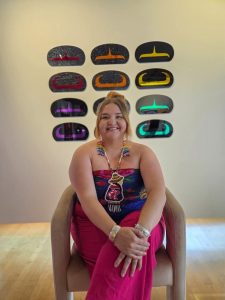Select a subscription plans
You need a subscription to access this content.
Jessica Matten (Metis Red River Cree) has spent her whole life helping move Native communities forward in a good, healthy way. She has worked extensively with Native youth, primarily all over Canada, to help break cycles of intergenerational trauma. Jessica’s goal of working within the film and TV industry is directly fueled by her philanthropic work dedicated to her people, especially the youth.
This summer, Jessica stars opposite Zahn McClarnon and Kiowa Gordon in Robert Redford, George R.R. Martin (Game of Thrones), and Graham Roland’s produced Dark Winds television series with the AMC Network as Bernadette Manuelito, a gritty and tough Native woman of color working in a police force in the 1970s. Here, Jessica sort of portrays the “bad*ss superhero Native woman” she’s always wanted to play: Bernadette is strong and resilient yet empathetic and caring. She’s undoubtedly one of the best–and favorite–characters of Dark Winds.


Being First Nations gives Jessica pride and power. She recalls a time when society didn’t accept First Nations people as they are now. “Growing up, it was not cool; we were made fun of, we weren’t seen the way we are now,” she says. Jessica certainly noticed the resurgence of Native and First Nations people reclaiming spaces where they’ve been historically excluded, and she’s excited to be a part of it. “It’s just a joy to be a part of this immense change that I feel is happening, not just in Hollywood, but awareness that’s being created worldwide. It’s wonderful for this generation and the youth as well, but also for our elders.” Jessica believes it’s finally safe for First Nations people to step into their power confidently. “The best way I could describe it is it feels like a warm hug. It’s nice that we could finally be confident in it; I worked hard to be confident and find pride in it when you have a society and the odds against you in many ways. It’s just nice to see the change and be a part of whatever’s happening right now.”
Surprisingly, Jessica never had dreams of becoming an actor. She always worked within the Indigenous communities because of how she was raised–Jessica is the daughter of activist, performer, and former model Theresa Ducharme who also provided for her people, but more about her later. She knew she wanted to help Native people, especially the youth, and as a young girl thought she’d become the CEO of an advertising firm, which would allow her one way to place more Native people in media. Jessica eventually received a minor in marketing and a Science Degree studying Human Ecology; a Bachelor’s of Science in how humans think and behavioral patterns, she adds. She ended up in London, England, at an advertising firm at the age of 21, in addition to a little stint at Elle magazine. “I worked for another advertising firm, and I seriously thought that was going to be my journey.” Jessica returned to Canada, where she worked at high-risk group homes in downtown Vancouver on East Hastings Street at the Urban Native Youth Association.
While working with the youth and throughout the Native communities, Jessica knew firsthand what was happening to them and their hardships, which added to her interest in acting. “I knew that I had a chance here to work super hard and let them see a version of themselves on TV and cinema that they could be proud of, that they could see in themselves. If you can inspire one person to see themselves through a character I played, that’s pretty much worth everything.” From there, she brainstormed how to become an actor. “I googled how to become an actor, and when I teach the youth now, I always say, ‘you have the internet. If you’re fortunate to have the internet in your community, then you can learn anything.'” So she went into the business, knowing what she wanted to do and what kind of image she wanted to create. “It was very thought out, and that’s because, as I said, since I was young, this is all I know of working within the Native community.”
Her mother Theresa also inspired her. Theresa opened up one of the first Native modeling agencies in the late 1980s called Mystique Models, with her twenty years of experience as an international fashion model. Jessica was just a child when her mother ran the agency. “I grew up having aunties coming over, and I would notice some would have bruises on their faces or marks on them. I realized what was happening,” she remembers. Jessica saw her mother’s agency act as a shelter and a place of support, safety, and belonging for women coming off the reserves and those already living in the cities. “It was a complete place of healing.” Jessica also worked at the Lemon Cree, the fitness and wellness organization her mother founded. Lemon Cree provides fitness and wellness programs in First Nation communities across Canada. This also showed her the importance of working with the community. “It’s something that I’ve been raised with my entire life, holding Indigenous workshops across Canada, running fitness and wellness companies helping people lose hundreds of pounds, and dealing with diabetes,” she recalls. “It’s so hard to encompass how deeply involved I’ve been with helping my people my entire life, but as you could see, all of this was strategic.” Seeing the likes of Tina Keeper, Michelle Thrush, and Tantoo Cardinal, who were all First Nations actresses coming up at the time, also motivated Jessica. “I always wanted to see a bad*ss superhero Native woman because let’s be real, the majority of Native women that I’ve grown up with are really tough, hilarious, kind, and resilient. These were all qualities that I wanted to portray on screen.”

Jessica stuck to her plan of becoming an actress with quite the resume. She starred in three Canadian Screen Award-nominated and winning shows: Frontier, Blackstone, and Mohawk Girls. She had a starring role in Elle-Maija Tailfeather’s short film, A Red Girl’s Reasoning, which took home awards at various film festivals. Jessica was in season two of Discovery Canada and Netflix’s TV show Frontier, starring Jason Mamoa and the new CBC drama alongside Kristin Kreuk in Burden of Truth. Other shows and films include Gemini award-winning show Blackstone, Pilgrims, and the critically acclaimed Crime Drama Tribal on APTN Network, which besides acting in, Jessica was the Associate Producer. She was also in the comic adaptation movie The Empty Man. Most recently, Jessica starred in Robert Redford, George R.R. Martin (Game of Thrones), and Graham Roland’s produced Dark Winds television series, which is Jessica’s first significant project in the US. There are several prominent Native people attached to this project, including producer Chris Eyre (Smoke Signals), actor and executive producer Zahn McClarnon (Reservation Dogs, Longmire, and The Last Manhunt), and actors Kiowa Gordon (The Twilight Saga, The Red Road, and Roswell), and Jeremiah Bitsui, (AMC series Breaking Bad and Better Call Saul). This is in addition to at least a dozen Native writers and consultants who all contributed to the series.
Dark Winds, based on the Leaphorn & Chee book series by Tony Hillerman, is a psychological thriller television series and the most recent original series to premiere on AMC and AMC+. The show is set on Navajo tribal land in the 1970s. It follows three cops trying to solve the murders of a couple of tribal citizens while dealing with reservation life and challenging their own spiritual beliefs. Jessica worked with Zahn and Kiowa for the first time seven years ago on Frontier. “It just felt like I was working with my uncle and brother,” she says. “Being on the show, you get to spend so much time with people, and you go through a lot of long hours together.”
In Dark Winds, Jessica plays Bernadette Manuelito, one of Lieutenant Joe Leaphorn’s (played by Zahn) officers. She describes her character as gritty and tough. Being tall in real life (Jessica’s 5’9″), she wanted Bernadette to be tall physically, mentally, and spiritually also, since she was one of the few females in the show and played a female lead. “I love that she plays in a man’s world as a minority and Native woman of color; she has another onion layer to her of being a woman of color who’s Native working in the police force, then another layer that she’s a woman who’s a Native woman of color working in a police force in the 1970s,” she explains. “So with all of that compounded, I love how strong she is because if you think of all those dynamics attached to her and what society expects and sees of her, Bernadette does not care whatsoever except for having her two feet planted on this earth, speaking and living her truth.” Bernadette is the perfect example of what she wants to bring back to the youth through storytelling: that no matter what your external circumstances are, no matter what society tells you, you be whoever you want to be. Jessica loves that Bernadette embodies confidence that wasn’t arrogant and that she’s still playful. Her least favorite thing about Bernadette? “In episode one, where she makes a meh face. If she’s in her power, would she be mocking Chee off the top? It’s a little too on the nose, but I would say there’s nothing I don’t like about Bernadette.”
Acting opposite Zahn was a highlight for Jessica. “Zahn is a joy to work with. I got so excited for my scenes with him because working with a phenomenal actor makes your work more fun. You get to challenge yourself and explore the depths of truth as an actor.” Working with some of the actors on the set of Dark Winds was a sort of reunion for Jessica. She reflected on knowing producer Chris Eyre since she was a kid. This led her to recall actor, playwright, and physician Evan Adams, best known internationally for his role as Thomas Builds-the-Fire in the 1998 film Smoke Signals, which Eyre directed. “Evan Adams was in my mom’s modeling course when he was beginning to film Smoke Signals, and I’ll never forget: there was this guy with two braids and a long, booming laugh. He was already practicing, ‘hey Victor!’ and I’m like, ‘why do you keep saying that?’ and he’s like, ‘I’m doing this movie right now while studying to get my doctorate.’ Indian Country’s so small in some ways still to this day, so it just feels like a whole reunion. It’s a joy.”
Smoke Signals is undoubtedly a childhood staple of many ’80s and ’90s Native kids. This motivated Jessica to create opportunities similar for the next generation of children who are watching the next round of Native actors. She just opened up the first Native film and stunt combat academy in the world called Counting Coup Indigenous Film Academy, which is done in partnership with the Old Sun Community College out of Siksika Nation and focuses heavily on mental health and wellness. She’s just been approved to work with twenty-five students to start. “They are our future. I believe in them so much. I’m their biggest hype man, you could say.” She recently received the best compliment regarding the academy from elders and parents of some of the students. They came up to me and asked, ‘what are you doing in there? We haven’t seen our child smile this much in years,’ and honestly, I could have cried because I can’t tell you how much acting has been a blessing and a joy to me,” she explains. “Running the school has been my life purpose and my life dream. Having students come up and say that without this program, they would’ve already taken their lives. I keep them afloat every week, as best as I can, to give them coping mechanisms and tools for the present so that they could move forward in their lives.”


This is the inspiration behind Jessica’s company, 7 Forward, the seven generations, and moving forward. According to Jessica, we’re currently in the fourth generation, and substantial changes need to be made now. “I think it’s so important to honor where you come from, and there’s so much power in focusing on the present and finding ways to break the cycles now. That begins with simple breathing exercises, journaling, and daily mental health practices.” Jessica and 7 Forward work a lot in conjunction with the college and its other mental health practitioners, where she plans to build out mental health clinics along with the Film Institute at the college, which used to be a residential school. “A lot of the teachers were children with horrific stories there,” she said. “To me, that’s a testament to how resilient they are, that even though they went through all that trauma there, they’ve decided to stay in this college and be a part of the healing. It’s so brilliant.” Jessica said being on Dark Winds is helping her to have a platform to speak about what she’s doing at the college and her people, which is all tied together. “It’s part of the shift. I’m grateful and happy to be working hard right now toward two things that I love.”
Through all of her work, on and off-screen, Jessica’s actively contributing to the creation of space and representation for other Native and First Nations actors and talents. Besides opening the first Native film and stunt combat academy with a massive emphasis on mental health, she’s in partnership again with the Old Sun College, where she has a huge tenure plan for the college. “What we want to do is eventually open it up to not just all of treaty seven, but all of treaty six, then eventually go nationally. So we want to open it up to everyone,” Jessica explained. “My purpose is to create true impact indirectly through acting. I believe in not talking the talk, but purely walking the walk.”











